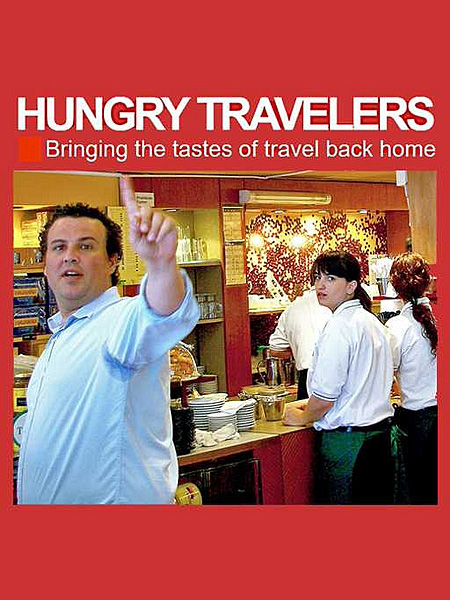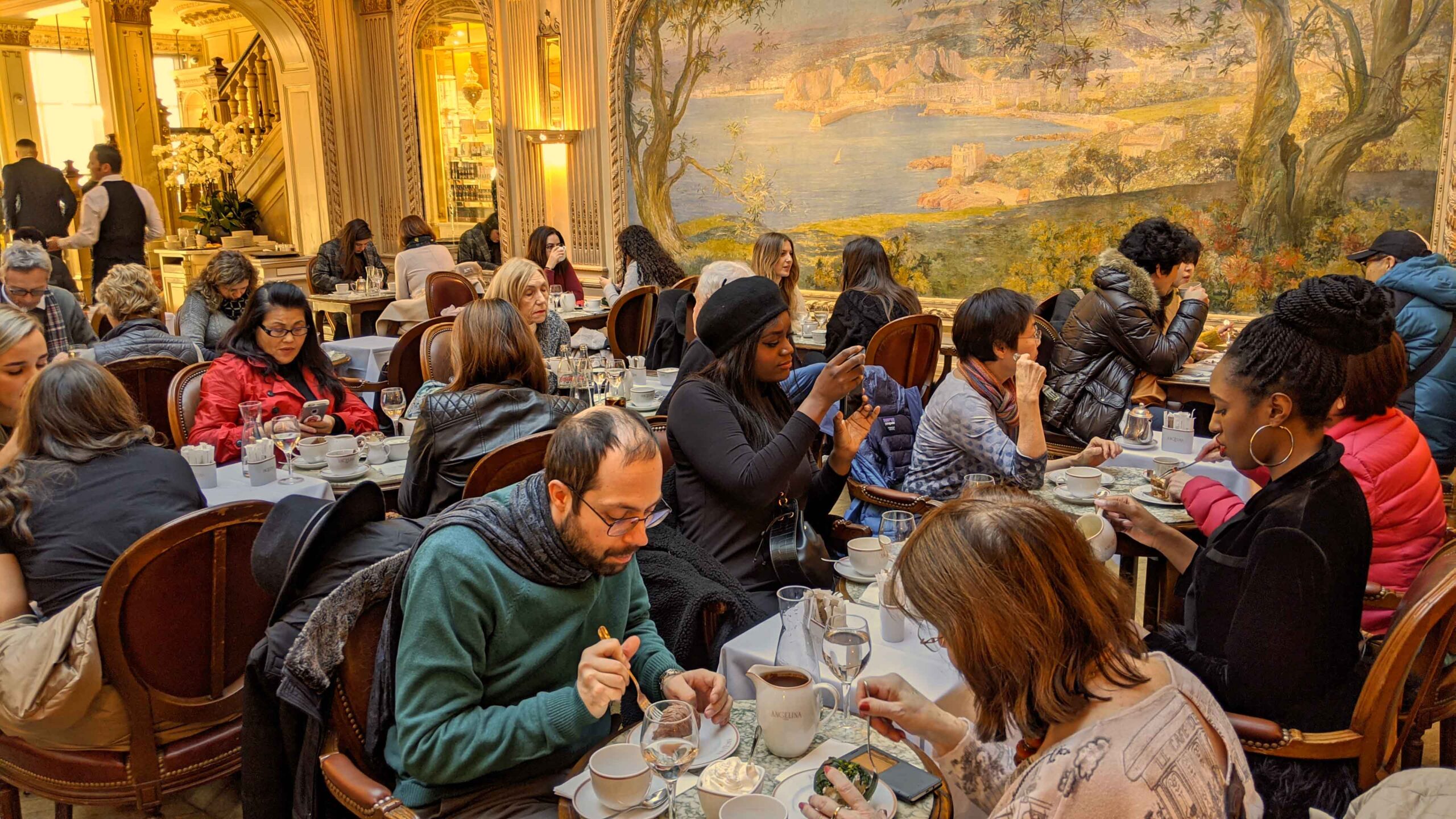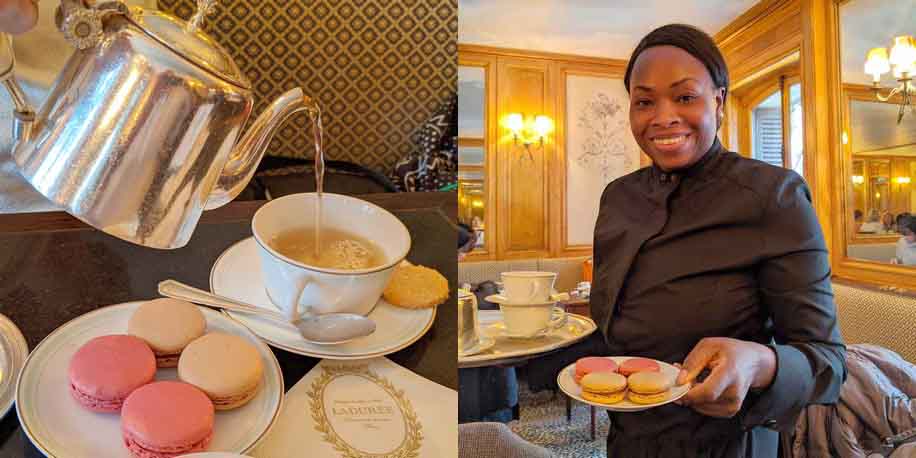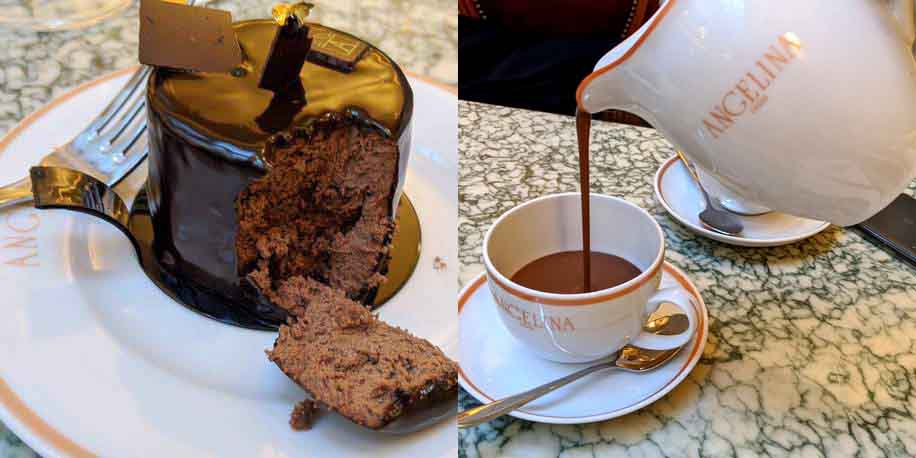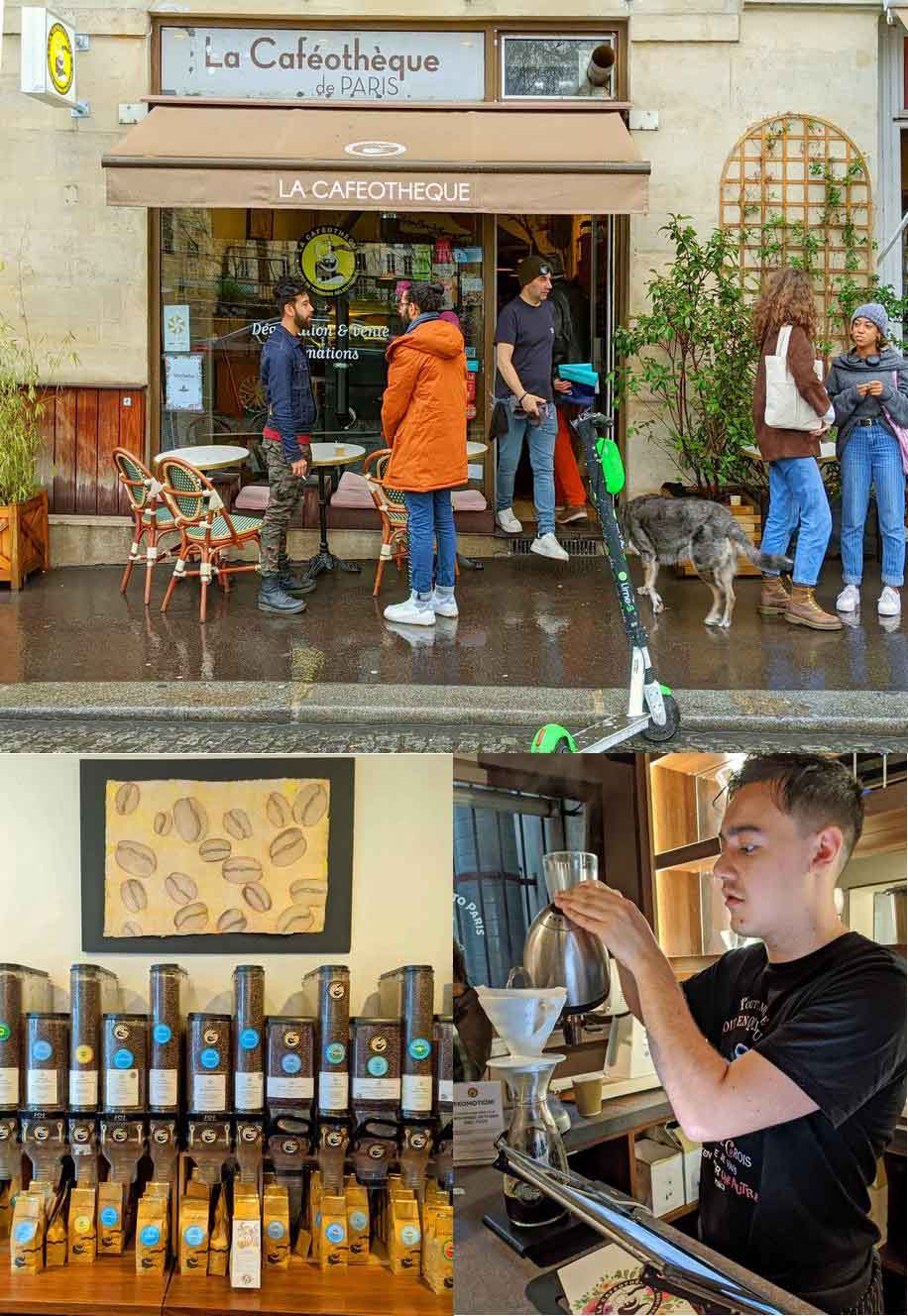We were happy to go to the Paris sales in January and early February because the climate there is notably milder than our home in Cambridge, Massachusetts. But winter is still winter, and cold rain and mist can be even more chilling than drifting snow.
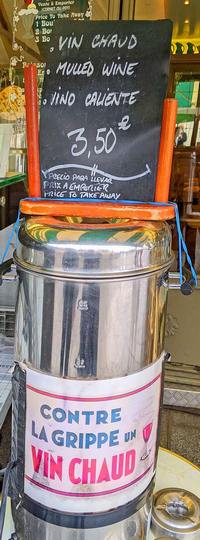 While tramping all over the city (the transit strike had slowed the Metro), it was nice to duck in for something warm. True, there was an enterprising vendor near the north side of Notre-Dame who sold cups of vin chaud to go. But drinking mulled wine from a plastic cup on a crowded sidewalk turned out not to be quite as warming as we hoped. So we explored a few salons de thé, the undisputed queen of hot chocolate shops, and a promising coffee roaster with a disconcertingly American vibe. In case you were wondering, the glittering scene at the top of the post is Angelina—but more on that in a moment.
While tramping all over the city (the transit strike had slowed the Metro), it was nice to duck in for something warm. True, there was an enterprising vendor near the north side of Notre-Dame who sold cups of vin chaud to go. But drinking mulled wine from a plastic cup on a crowded sidewalk turned out not to be quite as warming as we hoped. So we explored a few salons de thé, the undisputed queen of hot chocolate shops, and a promising coffee roaster with a disconcertingly American vibe. In case you were wondering, the glittering scene at the top of the post is Angelina—but more on that in a moment.
Sipping tea and munching macarons in a pioneer salon de thé
Ladurée Place Royale (16 Rue Royale, Paris; +33 1 42 60 21 79; laduree.fr) started life as a bakery, but when Baron Haussmann reformed the city in 1871, it evolved into a pastry shop near the Madeleine church. Within a few years, Jeanne Souchard, wife of baker Louis Ernest Ladurée, proposed expanding the pastry shop to include table service. Voila! One of the first Parisian salons de thé was born. It was an immediate hit—women could gather freely in a tea room in a way they could not in bars or cafes.
The location of Ladurée Paris Royale near Galeries Lafayette and Printemps department stores is ideal for ducking in from the weather for a pot of tea and plate of macarons while shopping the winter sales. The cookies are iconic. Ladurée ships them all over the world. But given the delicacy of the meringue, they are truly best when freshly made. You can book a tea time on the web site, though we were fortunate to get a table by sheer luck. Warning: Eating a macaron here will spoil you for all others.
Apologies to the Swiss and Dutch, but French chocolate rules
With its location under the arcade by the Tuileries Garden, Angelina (226 Rue de Rivoli, Paris; +33 1 42 60 82 00; angelina-paris.fr) is hard to miss. For one thing, there’s usually a half-hour line queued up on the sidewalk as people wait for a table. You’d think that given the proximity to the Louvre that Angelina would be flooded with tourists. But if you eavesdrop a little, you’ll find an almost even split between Parisians and visitors. In fact, locals love to bring visiting friends to Angelina because chocolate this good can’t be believed until you taste it.
We don’t know where Angelina sources its cacao, but the implication is somewhere in Africa—probably the former colony known as Côte d’Ivoire, or Ivory Coast. The signature hot chocolate drink is called ‶L’Africain.″ The signature pastry is a Mont Blanc. But we say in for a sous, in for a euro. The alternative to that meringue and chestnut cream confection is the ‶Choc Africain″ shown here. The base is a deep chocolate brownie, topped with dark chocolate mousse, and enrobed in bitter dark chocolate cream. Proust used to come here for chocolate and he probably insisted on madeleines. But Marcel be damned, the Choc Africain and a cup of hot chocolate topped with sweetened whipped cream is the closest most of us will get to heaven in this lifetime. Admittedly, two cups of chocolate and one pastry to split may set you back as much as a casual bistro meal. So what? It’s worth every bit (and every bite). You can always diet tomorrow.
On a quest for the elusive cup of good coffee in Paris
You’d think a nation that claims a coffee roasting style (‶French roast″) might have a rich history of good coffee. But that old-fashioned French roast is just a practice of overtoasting to hide the tinny, bitter flavor of cheap robusto beans. Unfortunately, the French preference for thin coffee brewed from burnt beans is still altogether too prevalent in the country’s capital. Even a simple café espress is usually made in a slapdash way without tamping down the ground coffee. Fortunately, only one of us drinks coffee and he’s willing to accept bad java as the price for eating and drinking in the City of Lights. It’s just one of those failings of national character, like the British penchant for brewing tea strong enough to double as paint remover even if you’re not going to add cream and sugar.
But some of the French have seen the light. A handful of small roasters have been popping up in Paris. They import their own beans, often from small farms and cooperatives where they have personal relationships. They are often run by top-flight cuppers, who know just how to roast a given bean and which way to brew it. And their cafés tend to attract a very similar crowd as specialty coffee shops do in the U.S. and Canada. The largely millennial crowd includes lot of dudes with scruffy beards and man-buns, women in leggings toting yoga mats, and persons of all genders wearing watch caps indoors. If you’re an American, especially one from the Pacific Northwest, the scene could make you homesick.
At La Caféothèque (52 rue de l’Hôtel de Ville; + 33 1 53 01 83 84; lacafeotheque.com) in the 4th arrondisement, some of the clientele even arrive on Lime rental scooters. That said, the establishment makes truly good coffee, with a strong emphasis on beans from various Guatemalan estates. Whether using the espresso machine (with proper tamping) or executing a pour-over in a ceramic cone, these Parisian baristas know their stuff. And if you can’t find a seat because all the other customers are slowly sipping while using the free wifi, La Caféothèque also serves drinks pour emporter.
